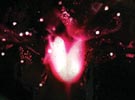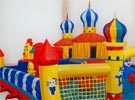ZHOU BIN: WHEN PERFORMANCE STOPS BEING PERFORMATIVE
TEXT:Bao Dong TRANSLATION:Philip Tinari
The first thing Zhou Bin did after he had ended his sojourn in the Beijing artists’ villages of Yuanmingyuan and Songzhuang and settled in Chengdu in 1998 was stage a performance. For this work, titled Historical Watermark, he used river water to wash a human form (or perhaps that of the Buddha) onto a stretch of old city wall slated for demolition. The action had the feel of a commemorative ritual. He followed this, the next year, with an intervention in public space called A Traffic Accident Scene, in which he lied on the street inside a chalk outline as if he had been the victim of a collision, attempting to attract attention from passers-by. Most of his works in subsequent years conveyed this same sense of ritual, involving naked bodies, self-inflicted harm, symbols, and different forms of cultural, social, and political narration. The period between 1998 and 2003 for Zhou was one of processing the various trends running through the performance art scene, then heavy on ritualized, staged actions. Pieces like N Times Screaming of the Man Drowning in Ink Water and Holding Ink Ice Till Melt used his own naked body and masochism as exaggerations of a certain romanticism, an artsy sentimental-ism in which the body was but a tool to express an idea, never explicitly occupying a particular site.
Only after 2004 did Zhou Bin’s work begin to convey a subtler relation to his own body, as he began to surrender control over it and subject it to different conditions. In one piece, he stood on a single foot and struggled to keep his balance as he licked at mustard until he began to tear up. In another he kept a RMB 1 coin in his mouth until he could no longer bear it and began to salivate uncontrollably. In these works, the utilitarian body of everyday life becomes selfsufficient, and more importantly, free from subjective intentions. Rather, Zhou intentionally surrendered control of his consciousness, giving it over to physics and biology, to the world of matter. We might take this as the point when Zhou’s performance practice began to mature, when he realized that art is less about expression than deliberation and reflection on the efficacy of expressive methods. Thus, the body must emerge from the performance and attain a widespread, real “body-ness.” Only when it does so can the body in turn become a “site” in its own right.
And yet Zhou Bin, unlike many practitioners of “body art,” does not take his body as a subject for debate; rather, he places it at the mercy of external forces, which is to say, he uses these external forces as an opportunity to bring it to the fore. Even as Zhou in this period emphasized external references—he chose that coin, for example, because it contains an image of the PRC national crest, and the mustard he licked spelled words with social content—his body did not enter into these meaning-making structures per se. For Zhou, the body is an autonomous territory, a place for experience of the self and not for the transmission of meaning. The best example here is Chase the Sun (2007), a performance atop the Guangdong Museum of Art in which he started into the sun for an entire day, subjecting himself to the biological and psychological consequences. This performance carried no explicit references whatsoever, nor did it rely on any external formalism.
Nonetheless, in these works, Zhou Bin’s experience of himself proceeds as intentional masochism, and masochism serves to prove the presence of a subjective will. Just as in the early performances of Zhang Huan and He Yunchang, the self-inflicted bodily harm actually unfolds in the service of a spiritual ritual. This type of ritual is perhaps invisible, but it is ritual nonetheless, inasmuch as the masochism emphasizes a breakthrough from everyday lived experience. Behind it still lies the entrenched division between “art” and “life.”
In fact, this manifestation of “the bodily” only carries meaning in the lived world. The moment we divide the lived world into “life” and “art,” the idea of “the bodily” becomes a foil, just as extravagant brushwork is often used as a foil for “the painterly.” From this perspective, Zhou Bin’s works during this period are interesting precisely where they touch on control and surrender. At the moment when, having stood one-legged, he begins to lose his balance and struggles to reclaim it, the fundamental nature of the lived world begins to reveal itself.
The lived world refers to a world that has yet to be systematized or endowed with meaning. In this world we encounter contingency, and have no choice but to engage it. In losing control of his body, Zhou Bin proffers a return to contingency, a response to the uncertainty of the lived world. To confront the lived world is to confront every possible relationship with others, with objects, and with the self. Seen in this light, the body is never solitary; only when implicated in various relationships does control over it take on meaning. Zhou is conscious of this problem as he inserts his body into the lived world. His 2009 piece Following made this transition manifest: he followed an ant through Tiananmen Square, trailing along behind until it disappeared into a crack.
In this way, Zhou Bin began to intervene in the realm of life, no longer emphasizing any distinction between “performance art” and “everyday behavior,” and saying farewell to ritual and public incident. He also bid farewell to the intentional staging of the subject that characterized his earlier works, along with any intentional emphasis on objective conditions. In fact, Zhou’s performances could even do without the label of “art” entirely. These actions are nothing at all, but in another sense, isn’t art precisely that which can’t be labeled anything else? More exactly, his is an art of everyday practice.
One unavoidable question is what Zhou Bin means to address in these works, or what he chooses as his subject. Looking at the title Following, and the setting of Tiananmen Square with its many layers of political significance, we cannot responsibly say that Zhou is not invoking political references. Instead, Zhou’s subjective political intention is the expression of a position within the bounds of what is politically acceptable, even if we may still be right to ascribe to this action, taken as art, a larger political agenda. In my view, the true political thrust of this work lies not with any intention, but with the possibilities it carries: here we are able to regard Tiananmen Square not as a political symbol, but as an ordinary place, a public site like any other, one in which we can watch an ant crawl. This is a politics firmly implanted in the lived world, not a doctrinaire or preachy politics. Doctrinaire politics inevitably rely, in both critical stance and methodology, on the discursive systems they seek to critique. So long as people still believe in the political meaning of political symbols, their own political consciousness can never differ very much from that of the system they oppose. In other words, so long as we take political taboos as taboos, the truly political moment will never arrive.




